Category Archive: Polyurea vs Polyurethane
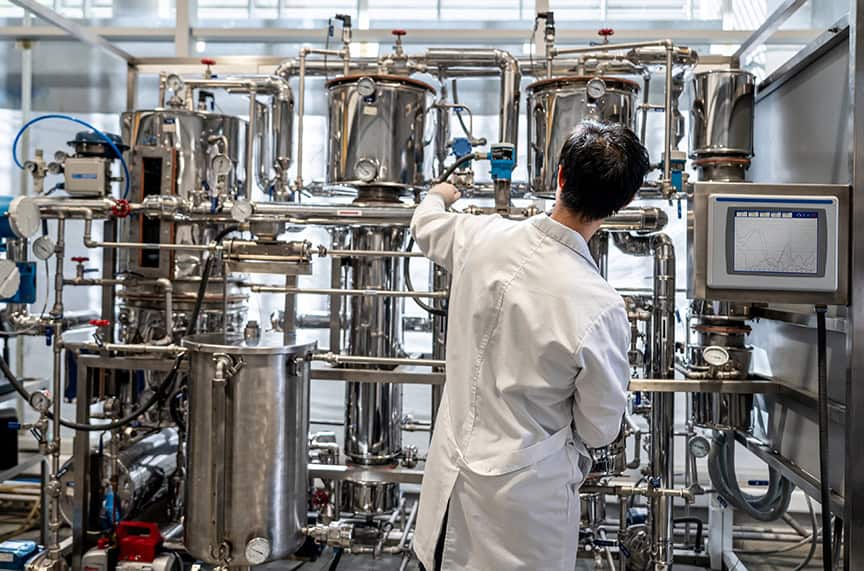
At Copps Industries, we pride ourselves on offering customized solutions to address your challenges and meet your needs. One of the most exciting aspects of our work is developing private label solutions, a process that involves close collaboration to create epoxy formulations specifically tailored to your processes.
Here, we’re taking a peek behind the curtain with our R&D experts and giving you an in-depth look at the steps involved in developing a private label solution with Copps.
From Exploration to Excellence: 7 Steps to Your Private Label Solution
Our approach is akin to having a virtual chemist on your team. We work closely with you to ensure every aspect of the epoxy solution we develop aligns with your specific needs. Our approach brings our experts into close collaboration with you so the formulation fits seamlessly into your production processes, enhances efficiency, and minimizes costs.
Step 1: Understanding Your Needs
Our process begins with exploration. We start by discussing what you like about your existing epoxy and what improvements you need. Through a detailed consultation, our experts listen to your challenges and goals, gathering all the input they need to begin developing a custom formulation.
Step 2: Conceptualizing the Solution
Once we have a clear understanding of your needs and challenges, we move on to conceptualizing the solution. Our R&D team and chemists brainstorm and design an epoxy formulation from scratch for you.
Step 3: Formulating the Epoxy
After conceptualization, our chemists get to work in the lab to create the initial formulation. Using our expert knowledge and advanced techniques and equipment, we develop a prototype that meets your specified requirements. This stage may involve a few iterations to fine-tune the product, refining our exploration into the right solution.
Step 4: Trial and Testing
With the prototype ready, we proceed to the test phase. We thoroughly test the formulated epoxy to evaluate the product in our lab. This stage is critical as it ensures the final product will integrate seamlessly with your existing manufacturing processes, paving the way for excellence.
Step 5: Verifying and Validating
When we feel confident in the solution we’ve developed, we provide you with the formulated epoxy for testing in your production environment. This is where you get to assess the real-world application of our product and provide feedback. That feedback will help us ensure the epoxy performs as expected and meets your standards.
Step 6: Refining Based on Feedback
Based on the feedback from our lab tests and your trials, we might return to the lab to refine the formulation. Continuous exploration leads to excellence, and our goal is to deliver a solution that exceeds your expectations.
Step 7: Finalizing the Product and Partnership
Once the formulation is validated and refined, we move into full-scale production. At this stage, you can confidently integrate our customized epoxy into your manufacturing processes. But our commitment doesn’t end here; in fact, we’re just getting started. Copps Industries aims to be your partner for the long run, offering continuous support and further innovation as needed.
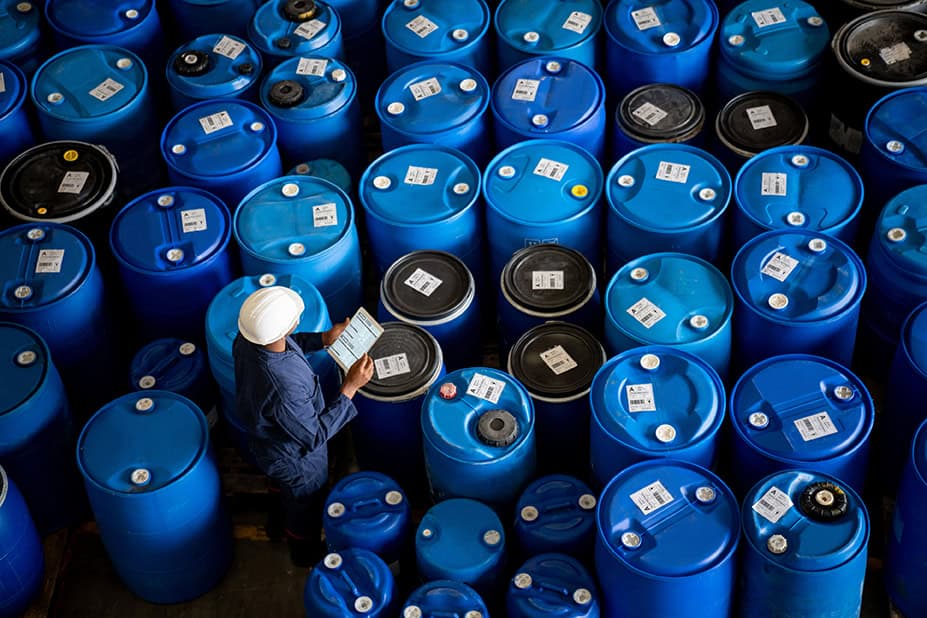
Innovation Through Partnership
Some suppliers dictate how you should use their products. At Copps Industries, we believe in innovation through partnership. We ask, “What do you need the epoxy to do?” This question, directed at engineers instead of chemists, allows us to push the boundaries of what’s possible. Once we’ve created a solution tailored to your unique needs, you won’t need to shop around—our commitment to a long-term partnership ensures you have a reliable, innovative partner by your side.
We’re also transparent about the feasibility of solutions. Sometimes, initial paper chemistry reveals that we can’t achieve a customer’s objectives. If we’re unable to meet your requirements due to health, safety, or cost concerns, we’ll be upfront about that. This honesty ensures our partnerships are built on trust and mutual respect.
Innovation with Copps Industries
At Copps Industries, we’re always eager to innovate unique private label solutions. By thinking differently and collaborating closely with our customers, we develop products that exceed expectations and set a new standard for excellence. Our approach fits various markets, allowing us to adapt formulations to any client’s specific needs.
Choosing Copps Industries for your private label epoxy solutions means partnering with a team dedicated to innovation, efficiency, and long-term success. Contact us today to learn more about how we can help you achieve your goals with tailored epoxy solutions.

SBTi: Reinforcing Our Environmental Commitment
At Copps Industries, we take our commitment to the environment, our community, and our customers seriously. In 2023, we took an extra step to reinforce our commitment to sustainability by joining the Science Based Targets initiative (SBTi).
SBTi plays a crucial role in mobilizing the private sector to contribute to global climate goals and transition towards a low-carbon economy. The initiative offers companies a clear roadmap for sustainable growth by determining the amount and speed of reducing greenhouse gas emissions.
What Are ‘Science-Based Targets’?
Proper organization and project management initiatives can help companies zero in on social and environmental goals as part of their ESG efforts. Science-based targets, in particular, are used to denote the specific goals—and pathways to achieving those goals—that companies will use to curb greenhouse gas (GHG) emissions.
The Science-Based Targets initiative is a framework that provides a clear series of steps for companies to ensure a sufficient reduction in greenhouse gas emissions. The framework uses scientific knowledge and a deep understanding of greenhouse gases to design specific, actionable goals. A goal meets the science-based definition if it aligns with the scientific evidence in the Paris Agreement, an international treaty focused on climate change and efforts to curtail or reverse negative environmental changes.
While many organizations are motivated to reduce their climate impact and have made strides in this direction, a clear framework and widespread initiative can make the efforts more effective. To achieve real change, we all must work together on a large scale. Ambitious, scientifically-backed goals lay the groundwork for worldwide transformation.
Driving Responsible Climate Action
Companies that commit to SBTi targets are seen as leaders in sustainability and climate action.
There are many benefits of participating in SBTi:
- Transparency and accountability: Setting science-based targets allows a company to affirm its commitment to sustainability and provides a transparent framework for reporting progress against specific goals.
- Stakeholder confidence: Science-based targets assure stakeholders like customers, partners, and investors that a company is diligently managing its environmental and safety risks and working towards sustainable change.
- Regulatory preparedness: By aligning with recommended science-based targets, companies can be better prepared for future regulations and policies aimed at reducing carbon emissions.
- Operational efficiency: Setting emissions reduction targets can increase efficiency and create cost savings by helping a company improve its energy management.
Copps Industries’ Science-Based Targets: Greenhouse Gases and Environmental Commitment
Of the nearly 9,000 companies participating worldwide, around 1,200 are headquartered in North America. Most companies involved are very large; organizations like 3M, Abbott, Conagra, General Motors, and others have all declared their environmental commitment through SBTi. As a smaller company, Copps Industries’ participation is somewhat unique.
Our SBTi journey began when one of our European private-label customers brought the initiative to our attention. We listened, evaluated, and determined that participating in SBTi aligns with our mission, which reflects a commitment to the environment and commitment to our customers.
Copps Industries had a long-standing environmental commitment, continually working toward reducing our environmental impact with efforts like:
- Removing flammables from our plant
- Replacing chlorinated solvents in favor of more environmentally friendly compounds
- Removing known and suspected toxic ingredients from our chemical formulations
- Upgrading our packaging to reduce waste
Joining SBTi has allowed us to refine our goals to reduce our environmental impact. The first step in joining the initiative was signing the SBTi Commitment Letter, which allowed us to declare our commitment to SBTi publicly. After signing the letter, we had a period of time to create science-based targets that fulfilled the SBTi criteria and submit those goals for SBTi validation.
Our submission was approved using a streamlined target validation route exclusive to small and medium-sized enterprises (SMEs). Our science-based targets include a commitment to:
- Reduce scope 1 and scope 2 GHG emissions by 42% by 2030 from a 2021 base year
- Measure and reduce scope 3 emissions
Reporting and Future Goals
SBTi serves as a reporting service, and all the data that participating companies submit is publicly available on the SBTi website. The dashboard displays the organizations that have committed to set science-based targets and those with greenhouse gas (GHG) emissions reduction targets validated as science-based by the SBTi.
SBTi milestones are measured at 5, 10, and 30 years. The near-term goal of the initiative is to encourage more companies to adopt important environmental metrics. As Copps Industries’ journey evolves, regularly reporting data will allow us to ask, “Have we made an impact? How can we make changes?” We have many measures already in place and will continue to drill down on the data to identify trends and opportunities for improvement.
SBTi and the Copps Industries Mission
At Copps Industries, we support SBTi and the continued efforts toward a future with reduced or net-zero GHG emissions to slow climate change. As a leading innovator in the epoxy product space, our mission is to continually innovate our products and services to meet the needs of our customers and the environment and prioritize the safety of our employees in the workplace. We aim to continue focusing on a cleaner future and providing consistently high-quality epoxy products.
Copps Industries is your go-to partner for high-quality epoxies, but we’re also your partner for environmental action and a more sustainable supply chain. Contact us today to learn more about our initiatives or request a quote.
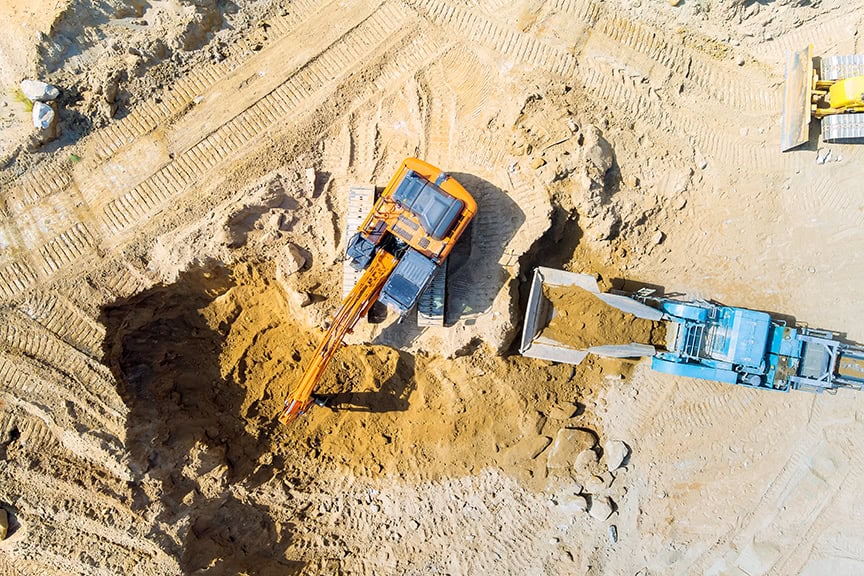
In the demanding, rough-and-tumble world of mining, equipment durability and efficiency are critical to operational success. At Copps Industries, we understand the challenges mining professionals face, and we provide advanced wear-resistant products that enhance the longevity and performance of your essential mining equipment.
Here, we’re highlighting two key applications where our innovative K-038 ArmorPlate Ceramic FC has made a significant impact: Overflow Ball Mill Outlet Boxes and Hydro-Cyclone Launders.
Application #1: Overflow Ball Mill Outlet Box
The overflow ball mill box plays a crucial role in grinding operations and is designed to overflow and discharge materials from the trunnion on the outlet side. Typically combined with a mechanical classifier or wet-processing cyclone, this setup is used for fine grinding in closed circuits or special applications such as regrinding in open circuits. However, the highly abrasive nature of the ore often leads to rapid wear and tear of the outlet box lining.
The overflow mill has a discharge steel box that is usually rubber-lined or ceramic-lined to resist high abrasion. These rubber linings typically wear out within 3-6 months, leading to frequent maintenance and downtime. To address this issue, Copps Industries introduced K-038 ArmorPlate Ceramic FC to replace the rubber lining.
Here are the benefits of using K-038 ArmorPlate Ceramic FC:
- Fast Cure Material: Minimizes equipment downtime by curing quickly.
- On-Site Repairs: Allows repairs to be made without dismounting the equipment.
- Easy Mixing and Application: Can be applied easily without specialized tools.
- Versatile Application: The paste can be applied vertically without sagging, unlike some competitor products.
- Superior Abrasion Resistance: With K-038, the anti-wear material lasts 9-12 months, effectively doubling equipment lifespan compared to rubber linings.
Application #2: Hydro-Cyclone Launders
Hydro-cyclones separate coarse materials from fine particles, operating through a vortex cone fed at the top by a pump. The launders are made of carbon steel and house a battery of three cyclones. The extreme abrasion in these launders necessitates the use of protective lining plates to prevent equipment damage.
Working with one customer, we saw these lining plates were coated with competitors’ ceramic beaded epoxy, which required up to two preventive maintenance schedules per year to keep the equipment running without failure. The downtime and maintenance frequency were significant challenges.
By introducing K-038 ArmorPlate Ceramic FC, we provided a solution that exceeded the customers’ expectations and reduced maintenance. Coating the lining plates with K-038 significantly improved the durability and abrasion resistance of the launders and reduced maintenance to just once a year.
Consider these advantages of K-038 for Hydro-Cyclone Launders:
- Proprietary Formulation: Developed over 35 years to address the unique challenges of the mining industry.
- Enhanced Performance: Outperforms competitors’ materials in both durability and abrasion resistance.
- Reduced Downtime: Minimizes the frequency of maintenance, ensuring continuous operation.
- Quick Cure Time: Allows for faster turnaround and less downtime during maintenance.
Wear-Resistant Products from Copps Industries
At Copps Industries, we’re proud to support the mining community with products that empower excellence and drive success. With the superior properties of K-038 ArmorPlate Ceramic FC, we’ve enabled mining operations to achieve greater efficiency, less downtime, and longer equipment life.
Our line of wear-resistant products was specially formulated with the mining industry’s unique needs in mind, and our commitment to excellence ensures that we continue to meet the industry’s evolving needs. For more information on our wear-resistant solutions and how they can benefit your operations, contact us or request a quote today.
At Copps Industries, we believe in the power of innovation. It’s evident in our products and our commitment to nurturing the next generation of chemists, developers, and engineers.
For years, we’ve taken steps to advance the industry by partnering with universities and research institutions across the nation. We’ve reaffirmed our dedication to student and industry development one project at a time.
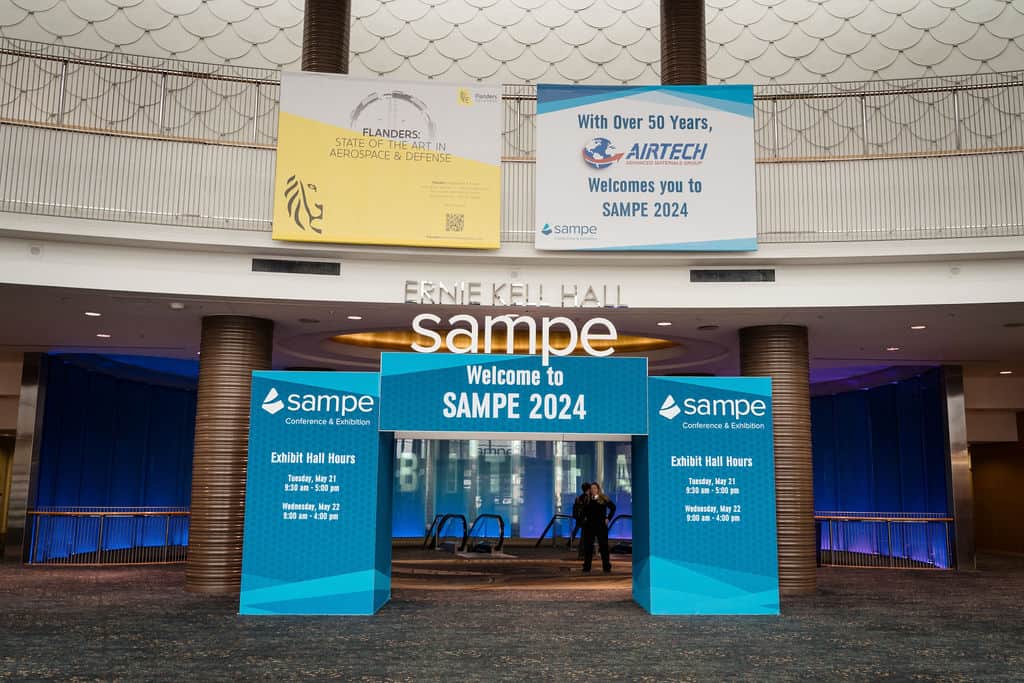
Fostering Innovation Through Partnership
Supporting transformative projects at the collegiate level is one of our top priorities—and a strategic imperative. By partnering with institutions like Oak Ridge National Laboratory, the University of California—Berkeley, and others, we’re doing our part to revolutionize industry standards and practices.
These collaborations are about more than just research; they’re about making real-world impacts. For instance, we’ve worked with Oak Ridge National Laboratory on cutting-edge research to help make carbon fiber technologies more accessible for use in industries like automotive, wind energy, and infrastructure. And our partnership with UC Berkeley’s Formula SAE team showcases our commitment to students who embody the innovative spirit we strive to support.
Copps Industries also closely partners with SAMPE, the Society for the Advancement of Material and Process Engineering. SAMPE connects professionals in the field to exchange insights and ideas on new materials and processing technology and often supports student-led student projects and competitions. Members of the Copps team actively participate with SAMPE to facilitate industry connections and provide resources for research and development.
Copps’ Epoxy Resins in Collegiate Competitions
Our involvement with the UC Berkeley Formula SAE team has been particularly exciting. The Berkeley Formula Racing team is composed of a diverse group of students from various disciplines, including mechanical engineering, electrical engineering, and business. This year, the team is developing a formula-style, single-seat race car from scratch, intended for the Formula SAE Electric competition at Michigan International Speedway in June.

Copps Industries has supported the team’s project by providing state-of-the-art epoxy resins essential for crafting key components of their race car. Advanced materials and processes play a crucial role in the Formula SAE competition. Our experts have worked closely with the students, advising them on the best resin systems and processes to optimize the performance and reliability of their car.
Impact Beyond the Lab
The support we provide to students extends beyond materials and advice. By investing in these future leaders, we’re helping to foster a culture of innovation they carry forward as they enter their careers.
It’s a story we’ve seen play out many times over. One example is a former student from Knoxville, Tennessee, who, after collaborating with Copps Industries on a university project, went on to start his own company. His familiarity with Copps and our capabilities led to an ongoing collaboration that has continued to shape his business—and ours.
This cycle of learning, innovating, and leading is what we’re all about—investing in the industry’s future and the bright minds that will lead it.
Looking Ahead: Powering Collegiate Innovation with Copps Industries
At Copps Industries, we’re committed to advancing innovation and education at all levels. Our contributions to student-led projects in automotive, aerospace, and other industries have fostered a culture of learning and a spirit of problem-solving that empowers students to transform classroom theories into tangible innovations.
As we look forward to the upcoming races and new projects in the pipeline, Copps Industries remains committed to pushing the boundaries of what’s possible in the products we create and the industries we help transform. Our work with these talented students is just one way that Copps Industries empowers innovation and leadership in engineering.
At Copps Industries, we pride ourselves on staying ahead of the curve in the rapidly evolving industries we serve. Our commitment to innovation is driven by a desire to meet the needs of our customers in various sectors, from mining to manufacturing.
Our expert chemists and engineers work hard to anticipate how changing conditions in various industries shape the future and how we can respond. Let’s dive in and take a look at the top three trends in resistant-wear materials right now.
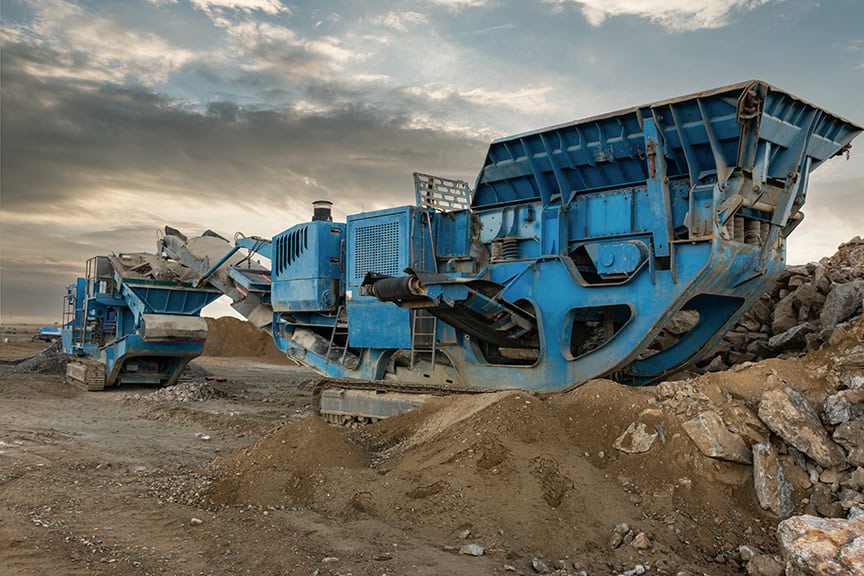
Trend #1: Impact-Resistant Materials
Resistant wear coatings are designed to protect surfaces from severe mechanical stresses like blows, strikes, and collisions. These coatings are essential in industries where equipment and components meet harsh operational conditions. For example, the mining industry has traditionally focused on materials designed to resist sliding abrasion from elements like sand, rock, and slurry.
The demand for high-impact resistant-wear materials is rising. Coatings ranging from ceramic to polyurethane to epoxy all provide durability and absorb shocks effectively. The next generation of solutions will become even more versatile to mitigate wear and prolong equipment life.
At Copps, we’re actively developing a new generation of high-impact-resistant materials. As customer needs for these types of materials emerge, we’ll be positioned to respond with formulations in our product lineup.
Trend #2: High Temperature-Resistant Materials
The mining industry is experiencing a significant shift with the discovery of vast lithium reserves in northern Mexico. The extraction and processing of this valuable resource demand materials that can withstand exceptionally high temperatures. Existing solutions can handle temperatures up to 450°F, but with the unique requirements of lithium processing, even greater strength and durability will be needed.
Copps Industries is braced for the challenge, actively researching and developing materials designed to perform under these extreme conditions. Our team of experienced chemists played a pivotal role in developing our existing high-temperature materials, and we’re pushing the boundaries of what’s possible to accommodate increasing needs. The key lies in enhancing our epoxy binders, which form the backbone of these high-performance materials.
Trend #3: Speed in Low-Temperature Environments
Efficiency is critical across every industry, and that means the speed with which materials cure and set is a top concern for many. Most materials today do best in ambient temperatures ranging from 60˚F to 120˚F. In colder climates, these materials might not perform optimally.
In regions like South America, with higher elevations and where temperatures can drop to 40°F, there’s a pressing need for materials that cure quickly. Customers in this region have told us most of the solutions in the marketplace today simply aren’t satisfactory under their working conditions. Copps Industries is collaborating closely with them to develop innovative solutions that cure faster at low temperatures, reducing equipment downtime and increasing productivity.

Copps Industries: A Partner for Innovation
At Copps, we’re not just following trends; we are anticipating and shaping them. Our ongoing product development is a testament to our proactive approach. Our innovation in impact-resistant, high-temperature, and quick-setting materials at low temperatures is delivering top performance and advancing industry standards.
Our promise to our customers is clear: Copps Industries is your partner in navigating the complex landscape of wear-resistant materials. We’re committed to equipping you with the best products to face the challenges of today and tomorrow. Contact us to learn more.
In the search for industrial products, too many organizations settle for a low standard. You might browse a catalog and order what’s available, even though it has features and properties you don’t really need or requires processes that delay your production. The price is acceptable, and you trust it will arrive on time.

But there’s a better choice: a custom solution formulated specifically to optimize your success.
At Copps Industries, customization isn’t just an option; it’s our preferred path to help you harness precision, efficiency, and cost savings. Here, we’re diving into our approach to customizing unique formulations and addressing the most common objections we hear to demonstrate why a custom solution is crucial to your success.
Understanding Customization
There’s a common misconception that custom solutions are more expensive and come with longer lead times than off-the-shelf products. And that’s often the case when you contract with other suppliers. Not at Copps Industries.
We’ve noticed that many customers aren’t aware that tailoring a solution to their specific needs is an option, let alone an affordable one. The usual instinct is to opt for standard products because they seem more accessible and can be fulfilled immediately. But what if the standard solution isn’t the perfect fit for your unique requirements?
Our Customization Process: Designed for You
At Copps Industries, our goal is to adapt our product to your process, not the other way around. We start by understanding what you want to achieve and examining what is and is not working with your current formulations. Then, we collaborate to create a formulation specifically designed to meet your needs—at no additional cost.
We don’t believe in charging more just because a solution is customized. We aim to understand your processes and develop an ideal formula for your processes while considering your cost targets.
Achieving Efficiency & Savings
Sometimes, concerns about availability and shipping delays come up in conversations about custom solutions. We’re transparent in addressing these questions head-on. If the necessary raw materials are available, your lead times remain unchanged. If your custom formulation requires unique raw materials, procuring them may extend the development phase. However, once development is complete, production and shipping will resume normal lead times without delays.
When considering costs, you might assume a custom solution comes with a high price tag. In cases where special materials are required, the initial cost may be higher. However, a tailor-made solution can result in significant savings in your manufacturing processes with increased throughput.
We have extensive experience developing products to create efficiency and reduce costs without compromising on quality or efficiency. One customer was using an aerospace-grade product primarily for its heat resistance despite having no need for many of its other properties. Working together, we developed a custom solution that focused on exactly what they needed and removed unnecessary properties. The resulting formulation met their specific needs, reduced their costs, and simplified their process—it eliminated the need for them to cure in specialized ovens, leading to huge operational savings.
Collaboration Over Compromise
We believe in collaboration over compromise. You tell us what you need to improve your process, and we work together to make it happen. This personalized process ensures a one-of-a-kind solution adapted to your needs.
Unlike many others in the industry, our threshold for customization is reasonable, meaning we can provide tailored solutions without the usual barriers, like extended lead times. Our capacity to develop and supply custom products quickly and efficiently is at the core of our approach.
The Virtual Copps’ Chemist is more than just a service—it’s a testament to our commitment to your success. As a catalyst for collaboration, the Virtual Chemist allows you to harness our expertise, secure top-quality products, and gain a partner dedicated to moving your business forward.
Go Beyond Standard Solutions with Copps Industries
Choosing a custom solution with Copps Industries means investing in your success at a cost comparable to, or even less than, standard options. Our formulations are designed to seamlessly integrate with and enhance your operations. We ensure you get exactly what you need without paying for what you don’t.
Why settle for the standard when you can optimize your output and secure your success with customization? We supply custom solutions on an everyday basis at Copps. Contact us today to learn more about Copps Industries and get started collaborating on a custom solution.
From high-speed race cars to cutting-edge aircraft, epoxy resin and carbon fiber are the secret ingredients powering innovation across industries. In applications where every ounce counts and resilience is non-negotiable, carbon fiber reinforced with epoxy resin is the go-to choice.
Let’s explore how this perfect match redefines what’s possible in strength and durability.
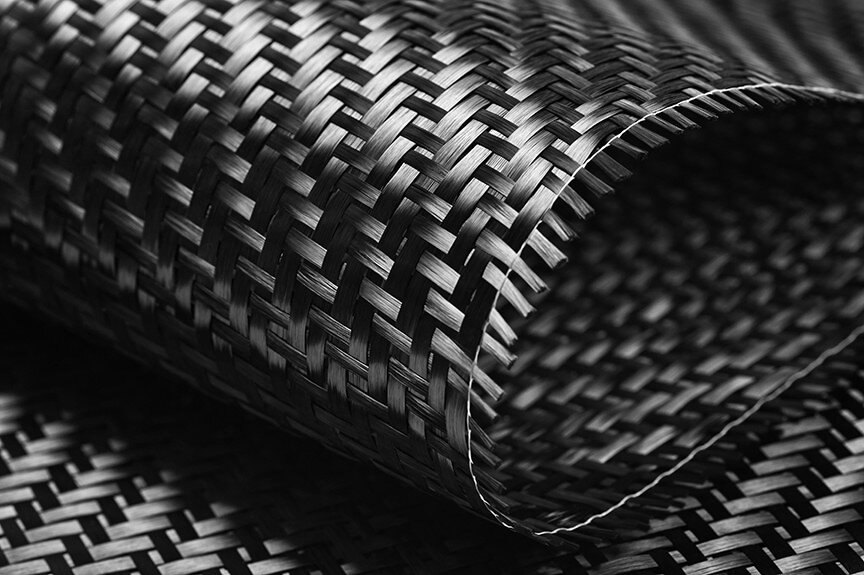
Epoxy Resins for Carbon Fiber
Composites are specialty materials made from a combination of fibers and resins. Epoxy resin is a thermoset polymer material that is heated and cured to chemically alter the material’s composition to create a permanently hardened substance. Epoxy resins can have glass transition temperatures above 400F˚, allowing them to retain their physical properties in high-temperature ranges. Once the liquid polymers in an epoxy resin solidify, the hardened piece becomes strong, resistant to chemical and thermal damage, and can withstand physical wear or impact.
Epoxy resin is advantageous due to its properties in its cured state. The material has the unique ability to fuse with carbon fibers to create an even stronger microstructure that showcases the advantages of both the epoxy and the fibers.
Carbon fibers are strong, lightweight, and fatigue-resistant fibers used to build composite materials. By combining carbon fibers with epoxies, manufacturers can create incredibly hard, durable materials that outperform both individual material types. Composites are a relatively new production material compared to materials like aluminum, iron, and steel, but there are many benefits to working with carbon fiber-strengthened composites that span a range of industries.
Carbon fibers resist fatigue, have low thermal expansion, and absorb or dampen vibrations. They are supplied in two forms that are suitable for creating composites. Carbon fiber tows are bundles of thousands of untwisted, continuous fibers that can be used directly in epoxies or converted into woven reinforcement materials like fabrics or tape.
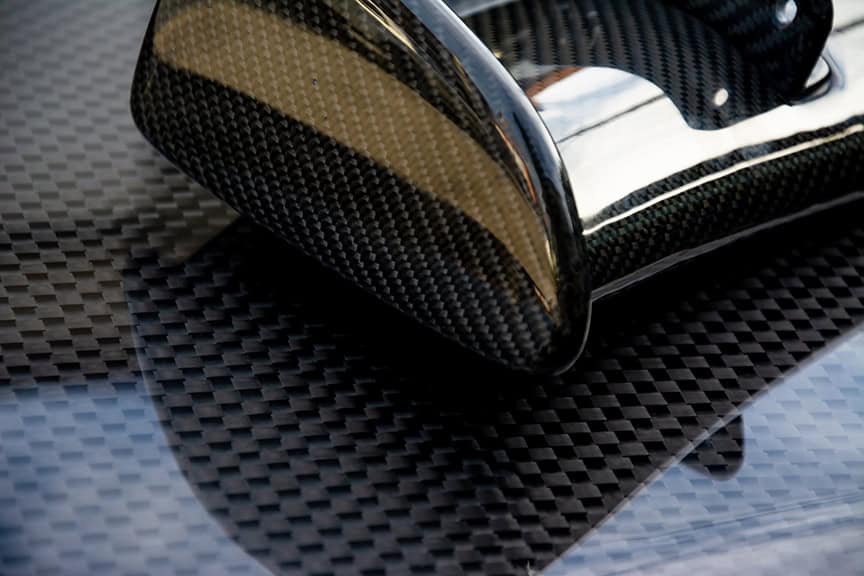
Benefits of Epoxy Resins for Carbon Fiber
Epoxy resin and carbon fiber composites are uniquely strong and offer excellent performance in commercial and industrial applications. Some of the benefits of this material include:
- Strength: Carbon fibers have high tensile strength but are prone to damage. Epoxy resins have low tensile strength, but their toughness and malleable properties protect the fibers from damage, creating an even stronger material.
- Lightweight: The composite material has an excellent strength-to-weight ratio, surpassing even aluminum and titanium. As a result, manufacturers can produce lightweight parts that can be used in more energy-efficient vehicles and assemblies.
- Flexibility: Despite its strength and durability, the composite is simultaneously very flexible. This means the material can withstand strong impact forces by absorbing the force. It also won’t develop spider cracks under impact or when the material is bent.
- No shrinkage: Epoxy resins won’t shrink after curing. This extends the lifespan of composite parts and components used in harsh environments.
- UV resistance: The composite material can withstand exposure to sunlight. It’s 100% UV resistant, so it can be used in long-term outdoor applications without the risk of wear or degradation.
- Aesthetics: Epoxy resin and carbon fiber composites are transparent, which makes them an excellent choice for visible components and consumer-facing products.
Applications of Epoxy Resins with Carbon Fiber
The versatility of epoxy resin and carbon fiber composites makes them useful in a wide variety of applications and industries. At Copps Industries, we formulate epoxy resins for composite materials used across the following applications:
- Aerospace
- Aircraft and avionics
- Automotive component construction and assembly
- Boats and marine applications
- Consumer goods
- Construction
- Corrosion-resistant parts for industrial and manufacturing equipment
- Military and defense—DoT-approved epoxy resin systems
- Oil and gas processing
- Sporting goods and recreational products
- Transportation
Choose Epoxy Resins with Carbon Fiber From Copps Industries
Since 1979, Copps Industries has been a leading provider of high-performance epoxy resins for use in civil engineering, adhesives, manufacturing, and more. Our company is ISO 9011:2015-certified as part of our commitment to excellent product quality. We produce resins for use in a wide variety of composite materials.
If you’re ready to elevate your projects with the strength and resilience of carbon fiber and epoxy resins, contact us today to request a quote and start your order.
As a professional society dedicated to providing information and resources, the Society for the Advancement of Material and Process Engineering (SAMPE) is a valuable network for scientists, engineers, and researchers. The SAMPE Annual Conference and Exhibition brings together professionals from around the world to explore the latest advancements in materials and processing technology.
Copps Industries is excited to have participated in the SAMPE Annual Conference and Exhibition 2024, held in Long Beach, California, May 20-23. Featuring a variety of speakers, technical papers, educational sessions, and an expansive expo, the event is a place where groundbreaking ideas are exchanged. Here, we’re sharing some of the highlights and key takeaways from this year’s conference.
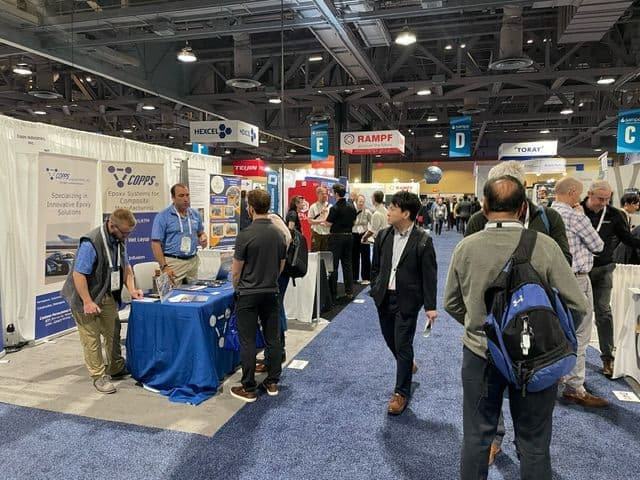
Keynote Address: Empowering the Materials and Process Community
An inspirational session at the conference was the keynote address, “Empowering the Materials and Process Community for Tomorrow’s Innovations,” by Stephen Heinz from the Composite Materials Division at Syensqo. Heinz discussed how industries reliant on composite materials have faced rapid disruption with the evolution of advanced air mobility and advances in technologies. He emphasized the need for materials and process professionals to innovate at the same pace to continue to advance the industry.
Themes of Advancement and Sustainability
The conference featured several sessions and panels reflecting key themes of advancement and sustainability. Some of those sessions included:
- Advancing Composite Materials Technology, which emphasized the importance of collaboration between academia and industry to drive innovation in composite materials and prepare the next generation of engineers to continue this progress.
- Sustainability and Circularity in the Advanced Materials Industry, which explored strategies for sustainability in the production and use of advanced materials and shared insights to help businesses integrate sustainable practices into their operations and product life cycles.
- Sustainability and Applications of Advanced Materials, which looked at the various applications that contribute to sustainability, from lightweight composites that reduce fuel consumption to materials designed for renewable energy systems.
Another standout session was “Doing Business in Mexico,” where Dr. Yadira Gochi-Ponce highlighted Mexico’s leadership in advancing multifunctional materials and the country’s significant aerospace manufacturing contributions.
USDOE & SAMPE Co-Sponsored Workshop
One of the key conference highlights was a workshop on Advanced Materials for Hydrogen Infrastructure Technologies, co-sponsored by the U.S. Department of Energy (USDOE) and SAMPE. The workshop examined state-of-the-art advanced materials like fiber-reinforced composites. Participants left with a better understanding of current challenges and opportunities and potential strategies to reduce costs and improve performance.
Exhibit and Customer Engagement
The exhibition floor bustled with manufacturers and suppliers showcasing their latest products and innovations, offering organizations the opportunity to engage face-to-face with potential customers and partners. For participating companies like ours, the exhibit hall offered valuable opportunities to connect with customers and gain insights into market demands and emerging trends.
Connecting to Copps Industries Values
Copps Industries emphasizes many of the same themes highlighted at the SAMPE 2024 Annual Conference as part of our ongoing commitment to innovation and sustainability. This includes our dedication to advancing materials technology and exploring sustainable solutions for our customers and the community.
The SAMPE conference provided a platform for industry professionals to exchange ideas, explore innovations, and foster connections. From an inspiring keynote to engaging sessions on sustainability and advanced materials, the event showcased how the engineering community is addressing some of today’s most pressing challenges. At Copps Industries, our commitment to sustainability and cutting-edge innovation ensures we continue to meet the evolving needs of our customers in the materials industry.
When it comes to composite manufacturing, you can choose from many materials and methods, each with unique advantages. Among the choices, two techniques stand out: the dry process and pre-impregnated (or pre-preg) process. Understanding the differences between the two will help you settle on the most effective way to bring your project to life.
Here, we’re comparing the dry process versus pre-preg to shed light on their characteristics and applications. From cost efficiency to customization to performance, you’ll learn that the dry process is often the best composite epoxy solution.
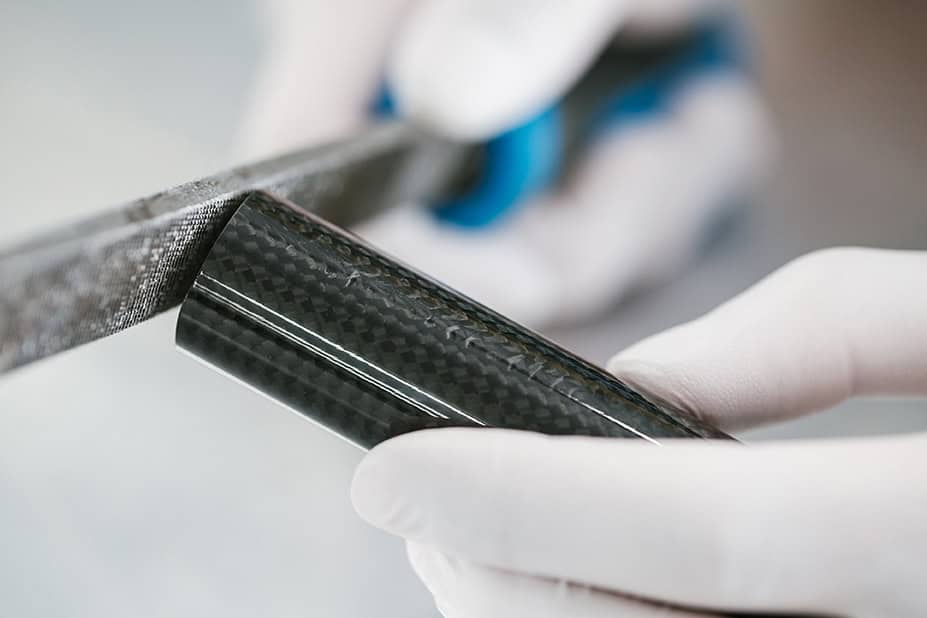
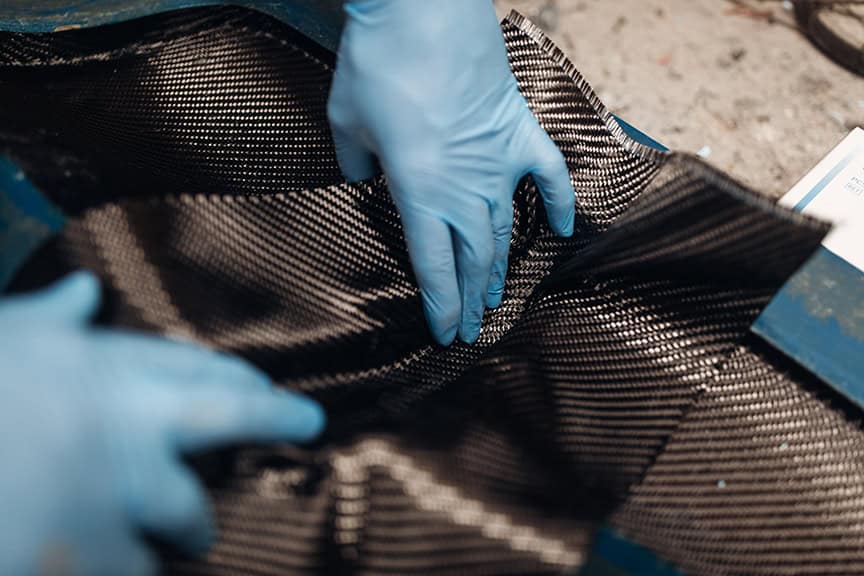
What’s the difference? Dry Process vs. Pre-preg Solutions.
Dry process and pre-preg solutions are two common methods for applying epoxy resin to fabric substrates. Each method comes with its own characteristics and applications.
Dry Process
In the dry process, a raw carbon fiber tow or fabric is loaded into a mold and epoxy resin is used to saturate the substrate. The resin then cures, bonding the fibers together to create a solid composite structure.
Characteristics
- Requires separate handling and application of resin and dry fibers
- Offers flexibility and customization in material selection and layup techniques
- Can reduce material waste and enhance performance
- More cost-effective and compatible with automation compared to pre-preg solutions
Pre-preg Solutions
Pre-preg refers to a composite material where reinforcing fibers are pre-impregnated with a resin before use. This pre-impregnation is typically done by the manufacturer, who applies a precise amount of resin onto the fibers and then cures them to a partially cured state. The pre-preg materials are then stored in a freezer until they are ready to be used. When heated, the resin cures, bonding the fibers together to create a solid composite structure.
- Characteristics:
- Reinforcing fibers are already impregnated with resin, simplifying handling and processing
- Requires freezer storage to prevent premature curing
- Offers consistency in material properties and performance
- Typically more expensive than the dry process due to additional processing and handling
Both dry process and pre-preg solutions have their advantages, and the choice between them depends on cost, production volume, and performance specifications. The dry process offers several benefits that make it the best choice for most applications:
The dry process involves lower material costs compared to pre-preg solutions. Pre-preg materials are often more expensive due to additional processing and handling.
The dry process allows for easier and faster customization and flexibility in material and techniques. You can tailor the resin type, fiber orientation, and layering technique to meet specific requirements and optimize the finished product.
With pre-preg solutions, unused or excess material can lead to waste due to limited shelf life, resin wasted in pattern cuts, and storage requirements. In dry processing, the fibers and resin are combined in the mold as needed, which reduces waste and limits your environmental impact.
- Improved Handling and Storage:
Dry materials are easier to handle and store than pre-preg solutions, which require storage in freezers. This simplifies logistics and reduces the risk of material degradation during transportation or storage.
Pre-preg solutions require additional processing steps and curing time, while dry processing offers faster cycle times and increased efficiency. The dry process allows you to streamline production without compromising quality.
Copps Industries Composite Epoxy Solutions
If you want to streamline your production processes, enhance product performance, and reduce costs, consider dry processing as the ideal composite epoxy solution. From cost-effectiveness and customization to enhanced performance, it offers benefits across a range of applications.
Copps Industries offers a range of standard and custom epoxy resin systems designed to meet your needs. Whether you need assistance with formulation selection or a solution tailored specifically to your project, we’re here to help. Contact us to place your order or request a quote.

















